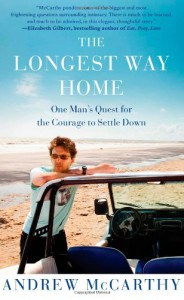 I like to travel, but wouldn’t say I have a strong sense of adventure--there are many places I have no desire to visit and activities I don’t personally wish to do. But that doesn’t mean I’m not still curious, and for that reason, travel writing appeals to me. Since most of my travels these days involve a forty-mile stretch comprised of the four Los Angeles freeways between my home and workplace, audiobooks are a great way to pretend I’m somewhere else. I recently spent a week in several locales, some exotic--Patagonia, the Amazon, Costa Rica, Mount Kilimanjaro--and some less so--New York, Baltimore, Vienna, Dublin--with Andrew McCarthy as my tour guide. Our travels also took me deep into McCarthy’s psyche as he inched toward that “triumph of hope over experience” event: marrying for the second time.
I like to travel, but wouldn’t say I have a strong sense of adventure--there are many places I have no desire to visit and activities I don’t personally wish to do. But that doesn’t mean I’m not still curious, and for that reason, travel writing appeals to me. Since most of my travels these days involve a forty-mile stretch comprised of the four Los Angeles freeways between my home and workplace, audiobooks are a great way to pretend I’m somewhere else. I recently spent a week in several locales, some exotic--Patagonia, the Amazon, Costa Rica, Mount Kilimanjaro--and some less so--New York, Baltimore, Vienna, Dublin--with Andrew McCarthy as my tour guide. Our travels also took me deep into McCarthy’s psyche as he inched toward that “triumph of hope over experience” event: marrying for the second time.If the author’s name sounds familiar, it’s probably because he’s “THAT Andrew McCarthy”--yeah, the one from the 80s (Pretty in Pink, St. Elmo’s Fire, etc.). He still acts, and sometimes he directs, but he’s also developed a career as an award-winning travel writer and editor-at-large for National Geographic Traveler magazine, where several of the pieces in his first book, The Longest Way Home: One Man’s Quest for the Courage to Settle Down, originated.
In many respects, McCarthy was already pretty “settled down.” He had two children and had been with his daughter’s mother for seven years; they’d been engaged for four of them. But when they finally began talking about wedding plans, he grew anxious and conflicted. He needed to figure out why--he hoped it wasn’t stereotypical male commitment-phobia--and as much as he loved his family, he needed to go off on his own to work through it.
It wasn’t long before the reason for McCarthy’s preference for solo travel seemed pretty clear to me: despite the fact that he’s made a living as an actor, a profession that seems to require extraversion, the guy’s a fellow introvert. While the book’s subtitle suggests he was searching for “the courage to settle down,” I think he was also seeking how to balance being a fully-invested partner and parent with preserving his core self--not an unusual challenge for anyone in a committed relationship, really. I never actually questioned McCarthy’s commitment to his fiancée or his children, and I'm not sure truly he did either. I think the struggle was more about intimacy and boundaries, combined with the concern of the once-divorced person not to end up a twice-divorced person. I was pretty sympathetic.
The book itself seems to reflect some of those intimacy-and-boundaries struggles. It’s not a fully-encompassing autobiography; McCarthy’s pretty sparing with backstory, and will definitely not satisfy your curiosity about his 1980s Brat Pack heyday. He’s remarkably introspective and intimate with the reader in some places while keeping a distance in others, most notably in not referring to his children by name and identifying his future wife--spoiler: he DOES find that courage--only as “D” throughout the book. That reserve keeps The Longest Way Home from fully satisfying as personal memoir, although I think it may connect better in audio format; I’m glad that’s how I read it. But the book also provides an introduction to McCarthy’s travel writing; I found that thoroughly engaging, and I wouldn’t be surprised if he keeps collecting awards for his work in that field.




